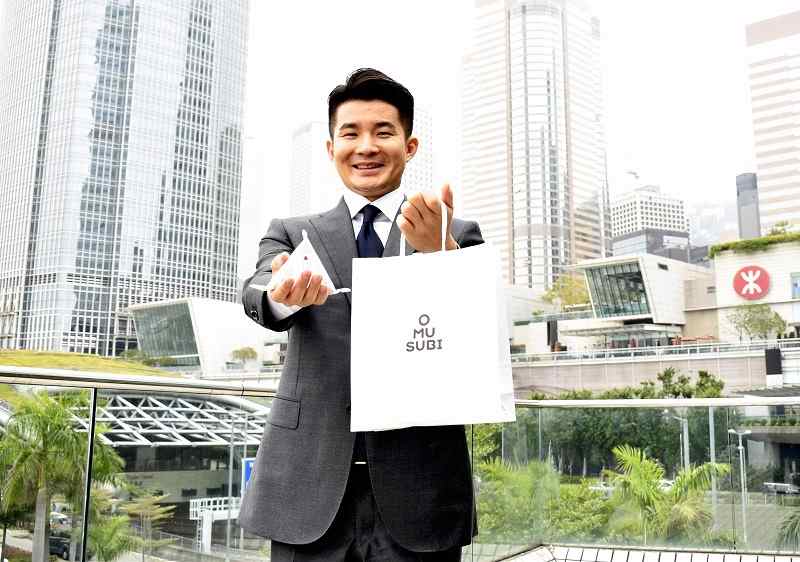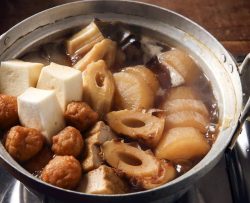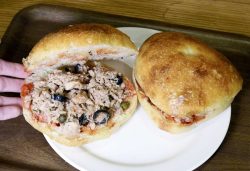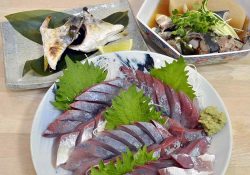
Muneo Nishida shows his products in Hong Kong.
17:30 JST, March 8, 2022
HONG KONG — Signs for Hana-musubi stores are a common sight near subway ticket gates in Hong Kong, beckoning customers inside to choose from a variety of omusubi rice balls made with Japanese rice.
Muneo Nishida operates more than 100 outlets in Hong Kong, selling omusubi with typical ingredients such as grilled salmon and umeboshi Japanese plums as well as unique products like spicy brown rice omusubi with chestnuts and mushrooms.
The cheapest omusubi costs 15 Hong Kong dollars (about ¥220). Some offerings are a little expensive, such as the teriyaki grilled mackerel for HK$26 (about ¥385), but the shops enjoy a steady flow of customers. Nishida has been selling omusubi in Hong Kong for more than 10 years now, and some locations sell more than 3,000 rice balls a day.
Nishida, the 37-year-old president of Hyakunousha International Ltd., was not particularly involved in agriculture or the omusubi business while he was living in Japan. Believing he could contribute to society by starting a business that matched the times, he established an IT company at age 19 while a student at Waseda University.
However, he wasn’t able to differentiate his business from other enterprises. Needing to make more money, Nishida became increasingly concerned that this was not his life’s work.
Hoping to learn something, Nishida sent letters to 400 company managers who had graduated from Waseda University, asking, “What kind of company do you think would make society a better place?” He received answers from 40 people.
The head of a major retail company met Nishida, then 20, and told him: “Agriculture is a core industry of Japan, but it’s in a slump now. I recommend that you change agriculture.”
For five years after that, Nishida learned about agriculture on his own. He read many books, asked authors to introduce him to farmers, went to see them and helped with their work. He was impressed by the enthusiasm of farmers for producing high-quality rice. With both the Japanese population and rice consumption decreasing, Nishida came to strongly believe that exports would be the key to improving farmers’ lives.
In 2009 and 2010, Nishida visited supermarkets in Hong Kong, the largest export destination for Japan-grown rice. Japanese products were just placed on shelves in the rice section, and did not have any unique characteristics.
Nishida thought Japanese rice would be better accepted by people in Hong Kong if it was cooked deliciously and processed into products that could be eaten as they were. He established Hyakunousha International Ltd., a company selling omusubi rice balls, in Hong Kong in 2010.
However, concerns over the safety of Japan-grown rice increased in Hong Kong after the accident at Tokyo Electric Power Company Holding Inc.’s Fukushima No. 1 nuclear power plant in March 2011, and imports of rice from Japan declined.
Nishida procured Japan-grown rice available in Hong Kong and opened a shop in June 2011, but sales were dismal.
Many customers mistakenly thought omusubi rice balls were sushi, with some people saying things like “Where’s the tuna?” and “I need soy sauce.” He was also told that Hong Kong people would not eat cold rice. However, Nishida continued to try to get people interested in his products, saying, “Omusubi is convenient; you can eat it anywhere with one hand.”
Nishida came to know that many elderly people in Hong Kong felt stressed and walked around aimlessly, a result of the small residences stemming from high property prices. So, in 2017, he opened a shop with a spacious eating area on the Kowloon Peninsula. Hong Kong is experiencing a dramatic graying of its population, with people aged 65 and older accounting for 18% of the total population.
A woman who came to the store with her 91-year-old father told Nishida: “My father can’t hold chopsticks, so he needs help with eating. But he can eat omusubi rice balls on his own, which helps protect his dignity.” Her words helped Nishida find new value in his business, as he was able to connect his business to customers’ thinking. He decided to spread the food culture of omusubi to the rest of the world.
His ambition is to open 2,000 shops mainly in Asia by 2025 and 10,000 around the world by 2030. To realize these goals, it is necessary to address people’s concerns about safety and environmental protection. In January, he launched a new brand called Omusubi. The Omusubi shop uses less plastic packaging and rice grown with a reduced amount of fertilizer.
Nishida also started exchanges with an agricultural high school in Miyagi Prefecture, from which he imports rice, wanting to tell students how popular omusubi is in Hong Kong and inspire them to have dreams related to agriculture and food production.
“I hope more people will want to operate businesses like this and follow my path. I’ll keep trying so that I can be a model for them,” Nishida said.
Top Articles in Features
-

Tokyo’s New Record-Breaking Fountain Named ‘Tokyo Aqua Symphony’
-

Sapporo Snow Festival Opens with 210 Snow and Ice Sculptures at 3 Venues in Hokkaido, Features Huge Dogu
-

Tourists Flock to Ice Dome Lodge at Resort in Hokkaido, Japan; Facility Invites Visitors to Sleep on Beds Made of Ice
-

High-Hydration Bread on the Rise, Seeing Increase in Specialty Shops, Recipe Searches
-

Heirs to Kyoto Talent: Craftsman Works to Keep Tradition of ‘Kinran’ Brocade Alive Through Initiatives, New Creations
JN ACCESS RANKING
-

Japan PM Takaichi’s Cabinet Resigns en Masse
-

Japan Institute to Use Domestic Commercial Optical Lattice Clock to Set Japan Standard Time
-

Israeli Ambassador to Japan Speaks about Japan’s Role in the Reconstruction of Gaza
-

Man Infected with Measles Reportedly Dined at Restaurant in Tokyo Station
-

Videos Plagiarized, Reposted with False Subtitles Claiming ‘Ryukyu Belongs to China’; Anti-China False Information Also Posted in Japan























